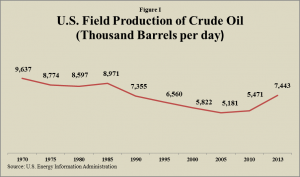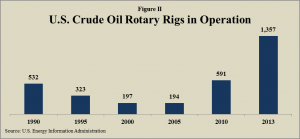Why the U.S. Should Already be the Global Energy Leader
Nearly 40 years ago, United States Congress passed legislation that would cease all exports on crude oil in the U.S. This was done as a way to protect our natural resources, and ensure that the country would have oil in the event of an international incident that would cut off our supply. The belief was that we would conserve what oil we had, and remove dependence on crude oil. However, it did the exact opposite.
The graph shows the amount of U.S. Field Production of Crude Oil per day from 1970 to 2013. In 1970, production of crude in the U.S. actually peaked and is the most barrels ever produced in a given year. An administration, claiming to preserve our natural interests, did the exact opposite leaving congress puzzled. However, free-market thinkers, are not puzzled. It is clearly visible that U.S. producers of oil realized the shrinking market, and began producing less and less oil. Since it was no longer advantageous to produce oil, they were forced to pull back on production or shut down altogether.
While the Energy Information Administration does not have data for oil rigs going back to 1970, we can see that until 2005 the trend was declining over time. Until the newest energy revolution or “Age of Innovation,” our country was in serious harm of reaching energy dependency. Legislation clearly harmed the oil industry and cost thousands of jobs, all for a result that produced the exact opposite of their intention. In order to achieve the desired effects the administration must do several key things;
- The first is allowing exports of crude oil. If exports are allowed again, the amount of oil production our country will achieve will be monumental and our lower prices will reflect that.
- Next, laws must be changed so that a new oil refineries can open in the United States. The amount of innovation and production at existing refineries is substantial, but there has not been a new refinery opened in 40 years. If our production rise is to continue a new refinery must be built.
- Finally, Obama must open the Keystone pipeline. While many point out the key economic benefits associated with the project such as jobs and lower prices, we must also recognize the diplomatic advantages. Canada wants the pipeline approved as well, and is irritated that Obama has not done so. We must open it to improve relations with Canada, and work with our neighbors in the energy sector. Even Mexico has key energy resources, and with the ability to privatize oil now, we can gain a lot from both of our NAFTA partners.
The volatile nature of international energy markets that includes OPEC members and countries in the Middle East could be avoided with propelling and establishing our own energy sector. We must begin removing the barriers that constrict our energy economy.


“United States Congress passed legislation that would cease all exports on crude oil in the U.S.”
Well U.S. Congress is very short-sighted to say the least. They pass regulations, but don’t take into account the economic impacts.
They stop exports, then wonder what happened?
“Since it was no longer advantageous to produce oil, they were forced to pull back on production or shut down altogether.”
I’d like to think our Congressmen had enough sense to know that.
Knowing what you have in your right hand, and telling people the truth about what’s in your hand are two different things. Congress preaches one scenario, when in reality they are trying to achieve another.
“Obama must open the Keystone pipeline. While many point out the key economic benefits associated with the project such as jobs and lower prices, we must also recognize the diplomatic advantages.”
This article is an interesting rebuttal to the Keystone XL pipeline. Perhaps we should recognize the disadvantages as well.
http://www.huffingtonpost.com/tom-steyer/keystone-pipeline-gasoline-prices_b_3605297.html
The disadvantages being foreign dependence on oil? It’s a market. Just because it goes to the US, does not mean that all oil will remain in the US. To believe that is foolish
The thing about the Keystone pipeline is that it would be the safest, cheapest and fastest way to move that oil too. And that it could have been built something like 3 times in the time between when the project was first submitted for approval and now.
http://www.economics21.org/commentary/putting-out-market-fires-north-american-oil